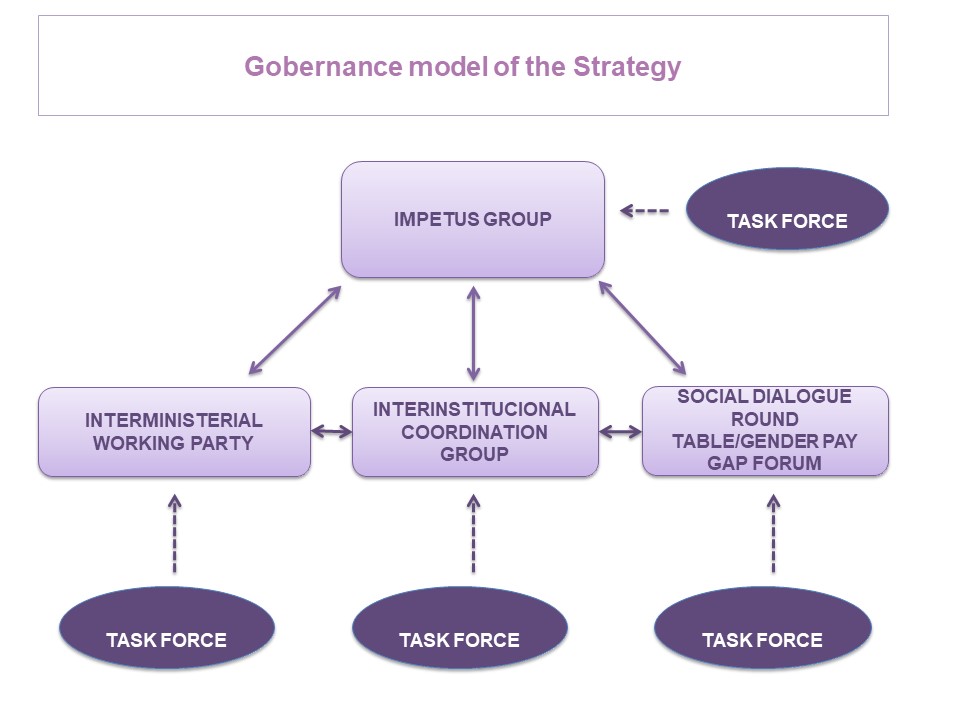Governance of the Strategy to reduce the Gender Pay Gap
- Governance Model of the Strategy
- Follow-up and coordination instruments
- Government ministries and entities in charge of the measures.
The Governance Model is the key instrument in the real implementation of the Strategy and Operational Action Plan to reduce the Gender Pay Gap in the Basque Country. Given the multi-disciplinary, cultural and structural nature of the problem of the gender pay gap, the Basque Government has designed a multidimensional strategy to address the different intervening factors and, from its role as a driving force, it envisages the involvement and commitment of Basque society overall.
The Governance Model is based on an appropriate organisational structure for the implementation, monitoring, follow-up and assessment of the Strategy and Operational Plan, in order to offer maximum transparency between the citizenry and economic-social stakeholders.

Impetus Group
Consisting of the Premier’s Office General Secretary and the Emakunde General Manager with the senior officials of the Strategy and Governance of the Plan.
Gender Pay Gap Interministerial Panel
The Interministerial Panel comprises the senior politicians of the Basque Government’s ministries with significant remit in the implementation of the Strategy’s measures to reduce the Gender Pay Gap. This Interministerial Panel is tasked with coordinating the operational deployment of the Strategy, assessing the measures and results of the Plan, identifying the corrective actions and coordinating governance with the other stakeholders.
Task Forces
The Task Forces are made up of the directors of the different Ministries involved in implementing the Strategy, the Administrative Units for Equality of each ministry, and the heads of their respective Communication Areas. Their main function is to drive the deployment of the Strategy.
Interinstitutional Coordination Group
Group consisting of representatives of different Basque institutional levels – Government, Provincial Councils and Local Councils - and its function is to coordinate and monitor the strategies and measures linked to reducing the gender pay gap in which they are involved.
Social Dialogue Roundtable – Gender Pay Gap Forum
Consultation and contrast space involving trade union and management representatives and which seeks to make progress in social agreements aimed at reducing the pay gap.
The Strategy and Operational Action Plan to reduce the Gender Pay Gap in the Basque Country envisages the implementation of 60 measures by six Government ministries and Emakunde-the Basque Institute for Women-, with the following breakdown of the goals:
Lehendakaritza – Premier’s Office
- Assess the real impact of the implementation of the measures in terms of the progress in reducing the pay gap.
Ministry of Work and Justice
- Reinforce specific inspection plans to correct possible gender pay discriminations.
- Inform workers on the right to no pay discrimination.
- Foster conciliation measures based on shared responsibility in Basque companies.
- Create a Basque Register of Equality Plans produced by Basque companies.
- Foster transparency in the pay reality and in the selection and promotion processes in companies.
Ministry of Education
- Increase the presence of women in STEM studies by means of training mentors, open-door programmes in technological companies, awareness raising among female adolescents regarding training in professional branches traditionally considered to be male domains and awareness raising among male adolescents about training in professions considered to be female domains.
- Help families to access social initiative and private infant schools by means of grants and subsidies.
- Guarantee full access to education for 0-3 year olds.
- Drive the co-educational school mode: Co-education Master Plan.
Ministry of Employment and Social Policies
- Drive funding programmes for SMEs, running pilot schemes and the implementation of other tools to foster conciliation based on shared responsibility.
- Raise awareness in society regarding the current care model, take steps towards a shared responsibility model, and drive the deployment of work-life balance plans and projects in companies.
- Focus family support plans towards shared responsibility regarding care with measures to prevent women having to drop out of the job market.
- Establish funding lines for companies to substitute workers on leave or reduced working hours as carers in their different facets.
- Set up support programmes to foster a level playing field regarding paternity leave in the private sphere.
- Promote positive parenthood programmes.
Ministry of Economic Development and Infrastructures
- Engage trailblazing companies and business associations with programmes that foster access for women to male-dominated professions and, in particular, to industry.
- Drive measures to increase the number of women in the top tiers of industrial companies of the BAC.
- Incorporate equality in the advanced management model (AMM).
Ministry of the Treasury and Economy
- Avoid possible gender pay discriminations in the contracts awarded by the Basque public sector with the introduction of specific clauses in that regard.
- Foster compliance checking of the clauses by means of result measurement and application indicators.
Ministry of Public Governance and Self-Government
- Propose plans of action in all these areas of the General Administration, along with Public Entities, Autonomous Agencies, Publicly-owned Companies and Foundations where the presence and participation of women does not reach 40%.
- Consolidate conciliation based on shared responsibility in the Basque administration.
- Monitor the problem of the pay gap in the Basque Government, main entities, autonomous agencies and publicly-owned companies of the CAE to promote action plans in those cases where the gender pay gap exceeds 10%.
Emakunde – Basque Institute for Women
- Raise awareness with respect to the challenge to eliminate/reduce the pay gap, conciliation based on shared responsibility and importance of care.
- Foster and promote training men in gender equality.
- Promote early-age coeducational programmes to progress towards shared responsibility.
- Economically advise and support companies to implement equality assessments and plans that contain specific measures against the gender pay gap.Perio
- dically update the report on the gender pay gap in the Basque Country for increased understanding of the factors that impact on them and be able to consider the necessary action.
Last modified date: